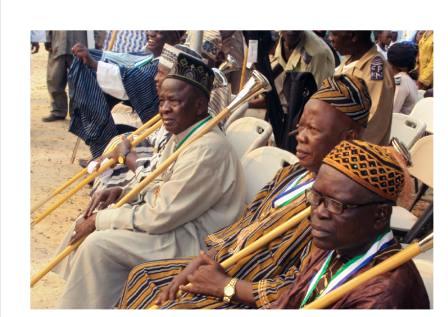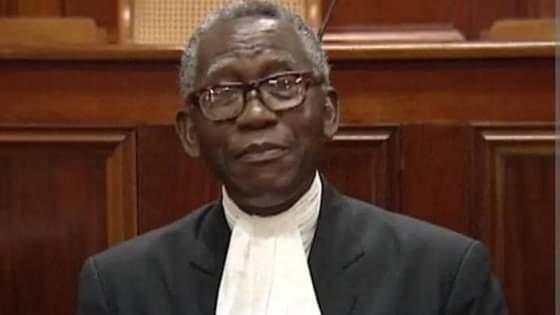Getting Paramount Chiefs involved in basic service delivery
Paramount Chiefs concede that political interference has been a key challenge to their authority
Traditionally Paramount Chiefs in Sierra Leone play an important role in maintaining law and order at chiefdom level, but they apparently need to go beyond that to ensure the efficient delivery of basic services such as health and sanitation, education, water and electricity supplies to their people.
This is one of the conclusions that necessitated the UK Aid funded SABI project which seeks to strengthen community-led accountability, increasing awareness of, and demand for, the delivery of basic services.
Operational in every district in Sierra Leone, the SABI project aims to build relationships between citizens and the state in supporting the effective delivery of essential services by contributing towards creating a more informed and empowered citizenry which can hold effective and ongoing dialogue with better engaged and more accountable state service providers.
“Paramount Chiefs leadership was assessed as part of the structures targeted by the project to enable the project design activities of engagement,” said Joseph Ayamga, Country Director of SEND Sierra Leone whose organization is one of the implementing partners working in the Eastern Region of the country.
“It was realized that PCs have strengths, but they also have different needs for capacity to make them effective in their work.”
Therefore, on 21st June 2018, a cross section of Paramount Chiefs, Section Chiefs and Chiefdom Speakers from Kenema, Kono and Kailahun districts met in Kenema City for a two-day capacity building workshop under the auspices of SEND Sierra Leone. The workshop discussed issues around the roles and responsibilities of Chiefs in development, leadership for community development, resource mobilization and accountability at community level, experience sharing on working with women, and other minor groups, and the Code of Ethics for Chiefs.
The focus of the workshop is to empower traditional leaders for leadership with the knowledge and practical skills for the development of their chiefdoms and to enable them clearly understand their functions and to perform them. It is also to create understanding of good leadership and how it promotes development.
However, during discussions the Paramount Chiefs lamented several challenges affecting their leadership roles and conceded that political influence (or interference) is a big challenge to their authority. They claimed that the central government is more recognized in the chiefdoms than they the Paramount Chiefs.
“Chieftaincy is the bedrock of development in Sierra Leone, but politicians have influenced the local structures and have misinformed our people to depend on NGOs and Government to bring development to their communities. Decentralisation is still hanging at the District Councils; it has not reached to the Chiefdoms,” said PC Musa N. Kallon II of Njaluahun Chiefdom, Kailahun District and urged for the SABI project to engage local/section chiefs to be able to initiate development in their communities.
Similarly, PC Alhaji S. C. N. Kono-Bundor II of Gorama-Kono Chiefdom said the workshop has given them the opportunity to re-examine themselves, looking at their strength and weaknesses and the development challenges they are faced with.
“I therefore recommend that we review our Code of Ethics every three years to improve on our roles and responsibilities as PCs, and we must hold regular meetings with the entire body of the National Council of PCs,” said PC Kono-Bundor II, who has been a PC for 33 years now.
On the other hand, PC Alamen Kanneh of Koya Chiefdom, Kenema District, noted that PCs have been rulers instead of leaders owing to their tradition. He therefore called on his colleagues to move away from that reprehensible tradition and become leaders so they can harness the skills and resources available in their chiefdoms for development.
“Rulers create fear in the minds of their people, but leaders serve and they bring everybody on board to develop the community,” said PC Kanneh.
Senior District Officer in the Ministry of Local Government and Rural Development, Moses M. Gbetty, noted that the Codes and Ethics of Paramount Chiefs were merged and designed by the PCs themselves and they should take the lead in developmental processes in their chiefdoms.
“As PCs you should manage your political feelings well, empower your people and provide services for them. You have to step up and exhibit true leadership. You are close to the people and you know their skills. You know your people well. Their skills and challenges. You should have a functional relationship with local councils,” said Gbetty.
He called on the PCs to popularize the Code of Ethics of Paramount Chiefs and let the President of Sierra Leone understand that they should be part of conflict resolution in supporting the implementation of the Local Court Act of 2011 as part of the matters requiring adjudication to the local court, and should include the Chiefdom Police as they are provided for by the Constitution of Sierra Leone.
On the issue of Gender Equality and Social Inclusion (GESI), Program Officer for Governance Allieu Marrah, urged the PCs to ensure total inclusion of everyone in the chiefdom (leaving no one behind) in decision making processes in the chiefdoms through the formation of committees like Chiefdom Committee, Village Development Committee, Facility Management Committee, etc.
In essence, noted Ayamga, we want the PCs to provide answers to the key questions which will help them to become development-oriented leaders of their people. For example, how do you work to achieve efficient service delivery in your chiefdom in the area of health, education, agriculture, and sanitation? How do you include people with disability and those who do not have access to resources and other minority groups in decision making process for the development of the chiefdom? How will you work together as Chiefs, share ideas and help one another? What kind of leadership strengths do you have and what are your weaknesses?
During the workshop analogies were drawn from short fabled stories on leadership including ‘The Owl Who Was God’, ‘The Tortoise, The Elephant and The Hippopotamus’ and the ‘The Ants Colony’. The PCs learnt various lessons from these stories.
“A leader must be a good listener because you don’t see or know everything,” said PC Tamba Emmanuel Torcho Foryoh IV of Sowa Chiefdom, Chairman Council of Paramount Chiefs in Kono district. “You must beware of praise singers because they most times mislead you. You must listen carefully, consult, find out, analyse, investigate and act. You must be inclusive. No matter how strong you are as a leader, you have your weaknesses and you cannot do it alone. Don’t underestimate the intelligence of your people, even the smallest member in your community matters.”
Furthermore, the PCs learnt that as a leader you should be able to identify the resources (human and natural) in your chiefdom that you can use.
“Development is a public good, not a private good. When it’s private, it benefits only a certain people. We want them to understand that leadership goes with responsibility. That is what the SABI project is all about. It is about empowering yourself and your people to work together for the development of your chiefdom,” said Ayamga.
SABI project is a four-year citizen-led accountability programme funded by UK aid and being delivered by a consortium led by international development agency Christian Aid.
By Ahmed Sahid Nasralla (De Monk)
Stay with Sierra Express Media, for your trusted place in news!
© 2018, https:. All rights reserved.






